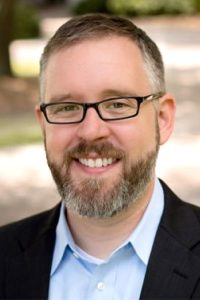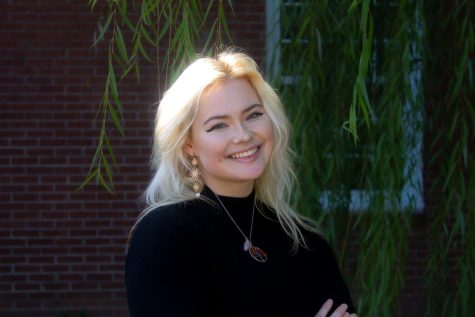Faces of Armstrong: Dr. Nathan Palmer

Ironically, this edition of Faces of Armstrong features one of this campus’ least physically present professors: Dr. Nathan Palmer.
After graduating from the University of Nebraska-Lincoln and marrying Dr. April Schueths, who also earned her degrees from UNL, the two moved together from Lincoln, Nebraska, to Statesboro, Georgia, in 2010. “It was the one opportunity that my wife and I, who also hold a Ph.D. in sociology, could find [with] two positions in the same department, so we wouldn’t have to work an hour apart or something like that,” Palmer said in an interview with Inkwell Staff.
Time has shown this decision to work out very well, as the spouses have professed on the same campus for over a decade. However, Palmer’s work has also landed him as the instructor of a site-synchronous social data analysis course that alternates between physically occurring in Statesboro and Savannah, with the respective virtual students participating through a video call.
Inkwell staff: When you started college, did you know you would go into teaching or sociology?
Dr. Palmer: No! I started as a digital arts major, then as a math major.
Inkwell staff: When you first started college with your visual arts major, and then later, math, what was the career path you were going for?
Dr. Palmer: I wanted to be a graphic designer, but like… I was too early. I wanted to be a computer-based graphic designer, and they wanted me to learn how to paint, draw, and sculpt. And I was like, “I like the computer,” and they’re like, “No one gets careers using computers.” They are in 2022- everyone uses computers to do art- but they told me that I was a fool. I picked something else.
Inkwell staff: That’s a good use of the word fool. I like that.
Dr. Palmer:: Good!
Inkwell staff: When you switched, you said you switched to sociology?
Dr. Palmer: Yeah!
Inkwell staff: Did you intend to teach, or did you want to go into research?
Dr. Palmer: Yeah, I would say that I was focused on research. At the time, I wanted to be an environmental sociologist, and I currently teach environmental sociology in the summer, so I did become an environmental sociologist in that sense, or whatever? And I published research on environmental sociology- that was actually the first thing I ever did, was that. But, yeah, I mean, as silly as it might sound, I guess I wanted to. I sort of was foolish enough to think I wanted to save the world.
Dr. Palmer: In terms of research, the things that I’m interested in are, like, I look at how people make sense of inequality and how people make more specifically- or more generally, I should say- of social phenomena. So like, how do people understand why the unemployment rate goes up and down? Or why does inflation go up or down? Or why do racism and discrimination, in all of its forms, occur? Things like that. Specifically, how can people, in addition to the individual explanations that most people have top of mind about why people experience the outcomes they do, things like that- how can they add to that more complicated view of how society influences individuals’ outcomes and our collective outcomes? I guess I just want people to realize the world’s more complicated than it really is and live in that truth.
Inkwell Staff: Wow, very good answer. This last thing is, like, really important. You’re on the spot. You only have one shot; please don’t screw it up. The pressure’s on.
Dr. Palmer: Alright!
Inkwell Staff: How’s your week been?
Dr. Palmer: Agh! Mediocre! [laughs] I mean, I’m getting over COVID- I’m over COVID- but then, my wife’s been sick, and my daughter was sick before that, and I’m playing catch-up from having to cancel class last week. Usually, I’m over-prepared and early for everything, and so it’s uncomfortable for me to be behind and makeup things, you know what I mean?
After thanking him for his time, Dr. Palmer raised one more point that he wanted to nuance during our conversation, that being a recent opinion piece published by Inkwell’s very own Editor-in-Chief Jabari Gibbs, which takes a stab at site-synchronous courses similar to the nature of Palmer’s data analysis class.
Dr. Palmer: I was- I was not worried, but I was curious about whether or not that’s what this is for or whatever. I have not had a chance to read this article yet, but my colleagues, lots of them have, and many of them said that they definitely understood the arguments that were being made and all that. I look forward to reading it this weekend or maybe later tonight, but. Because you know, like, as a teacher, I want the least amount of complication- friction- as possible, you know what I mean? [laughs] Between what I’m trying to convey and what the students are receiving and how learning’s going. And so, if it’s up to me, I would teach two classes and be here [Armstrong] for this one, and then I’d be there [Statesboro] for that one, but structurally, they can’t do that. But I’m glad that the Inkwell, as an outlet, felt brave enough to sort of speak their truth.




Sarah • Aug 29, 2022 at 3:34 pm
WOW! I loved this article so much! I think i’m gonna use the link of this article the the name of my first born child! This was an amazing insight into a teachers life and how he reached the point he got to. Very well done the writer of this piece deserves an award!